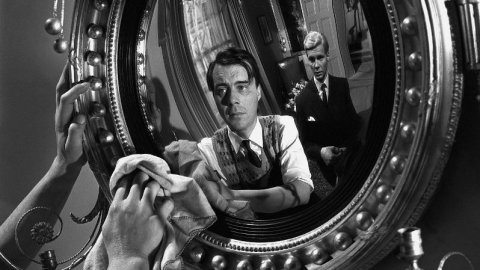
Amy Sargeant
on Thu 7 July 2016Risky Reflections: Slocombe's cinematography in The Servant
Posted on Thu 7 July 2016
Dr. Amy Sargeant reflects on The Servant
Remarkably, The Servant (1963) was Harold Pinter's first screenplay, adapted from Robin Maugham's 1948 eponymous novella. Pinter's The Caretaker had transferred to screen in 1962. After a bumpy start to his relationship with its director, the American émigré, Joseph Losey, the pair went on to work together happily on Accident (1967) - similarly concerned with class and featuring a game of tennis - and The Go-Between (1971) - likewise concerned with class and featuring a game of cricket.
The Servant was a production combining the skills of veterans (the production designer Richard MacDonald, editor Reginald Mills, cinematographer Douglas Slocombe and camera operator Chic Waterston) and the relatively new faces of James Fox (son of Losey's agent, Robin Fox), as the master, Tony, and his then girlfriend, Sarah Miles, as the maid, Vera. John Dankworth, who appears with his band in the cabaret scene of the film, provided the film's score with his wife, Cleo Laine, delivering lyrics written for her by Pinter. For Dirk Bogarde, The Servant proved momentous, allowing him to break once and for all from his unwanted reputation as the 'Idol of the Odeons'. The critical reception of the film in Europe prompted his subsequent casting by Rainer Werner Fassbinder, Liliana Cavani and Alain Resnais. A brief spell covering for Losey on The Servant confirmed that Bogarde would never become a director.
Losey was a sympathetic editor of the draft script, rendering it, if anything, more Pinteresque than Pinter. Crucially, scenes set outside the house (located in Royal Avenue, Chelsea) were cut, emphasising a claustrophobic interiority as the master-servant relationship degenerates. The house becomes a player in the action rather than simply its setting. The audience is obliged to spy on events unfolding - notably by way of mirror shots - just as Barrett (Bogarde) eavesdrops on his master and his adversary, Tony's fiancée, Susan (Wendy Craig).
The portrayal of a gentleman's gentleman in English fiction has numerous precedents, with Pinter drawing, seemingly, on P. G. Wodehouse's coupling of Jeeves and Wooster. The film takes as its theme the notion of servitude and the class distinction it betokens. Futhermore, concurrent political events (the Profumo Scandal) conspired to freight the film with a particular significance for contemporary audiences on The Servant's X-rated release in 1963.
Maugham disliked the film and duly wrote his own stage version (1966). Perhaps Maugham, the son of a Lord Chancellor, was nervous of the film's homoerotic content, made explicit in Matthew Bourne's recent adaptation, Play Without Words. Yet, today, the film, however indebted to Maugham, is better recognised than its source.
Written by Dr. Amy Sargeant.
The Servant screens on Sunday July 17th at 12pm as a part of our Celebrating Slocombe season, Dr. Amy Sargeant will introduce the screening.
